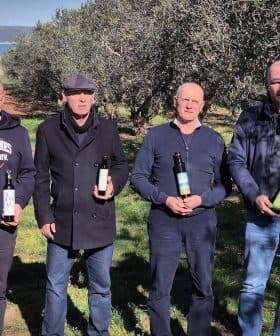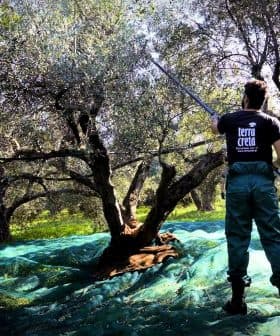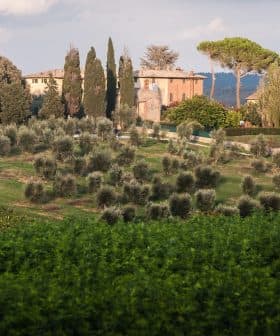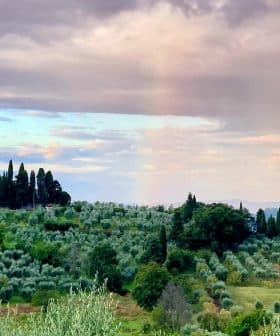Syrian Women Given the Chance to Learn New Skills From Italian Farmers
Seven small-scale Syrian farmers were given new hope for a better future as they learned new skills from farming communities in Piedmont and Liguria.
 Photo courtesy of ©FAO:Alessandra Benedetti
Photo courtesy of ©FAO:Alessandra BenedettiNine years of civil war in Syria have left many women as the primary breadwinners for their families, forcing them to seek new ways to support themselves. Seven Syrian female farmers recently traveled to Italy to learn new skills from farming communities in order to provide for their families and grow their businesses, with the hope of eventually improving food security in Syria.
Nine years of brutal civil war in Syria have had devastating consequences on the country’s women. As hundreds of thousands of men have been killed, detained or simply gone missing, women have been forced to come up with new ways to support their families as the role of breadwinner was thrust upon them.
Many Syrian women who saw agriculture as their only hope were hindered by their scant experience in farming and a lack of access to information on funding and training opportunities.
I want to learn from the Italian farmers and see how I can develop my business. If I can sell my products properly, my life will be better.
Last week, seven small-scale Syrian female farmers were given new hope for a better future as they traveled to Italy to learn new skills from farming communities in Piedmont and Liguria.
The joint initiative between Slow Food and the Food and Agriculture Organization of the United Nations (FAO) aspired to help the women provide for their families and grow their self-confidence as entrepreneurs.
See Also:Syrian Olive Oil NewsThe seven female food producers who took part in the study tour were from Aleppo, Homs, Hama, Lattakia, Tartous, Sweida and Al Qunatra. Each of the women produced a specific product in their village and these ranged from dried figs and honey to olive oil.
All of the participants either owned a tiny plot of land on which they grew food to feed their family or were engaged in activities such as jam and pickle making or producing cheese to support their families.
Patrizia Epifania, FAO’s program officer who accompanied the women on the study tour told Olive Oil Times that the selection process took into consideration similarities between what the women already produced and the types of goods produced by the Italian projects they visited.
Epifania said that although the women were glad to have been selected. “They had never left Syria before, hence it has been quite an intense experience, but they all showed enthusiasm.”
The study tour took place in Italy’s Piedmont and Liguria regions, which are renowned for producing and promoting high-quality organic and artisan foods while upholding local traditions. The Italian projects included extra virgin olive oil, high mountain honey, Robiola (cheese) di Roccaverano, Sambucano lamb, Vessalico garlic and butter production in the high Elvo Valley.
The women were educated on all aspects of production, marketing and the value chains of products for bringing in a decent income while also respecting local food heritage, the environment and biodiversity.
A small-scale olive oil producer from a Syrian village near the coastal city of Tartus visited the Italian olive oil project in Liguria. She told the organizers that she will benefit greatly from her experience in Italy and pledged to share what she had learned with her community.
Afaf Jafaar, a mother of five who grows and dries figs, described how she aspires to make products that meet global standards by replacing her archaic machinery with modern packaging equipment and new technology to measure moisture and acidity levels.
Aicha Dalati, a beekeeper from Aleppo, lost all her hives during the conflict and was forced to flee the city and start anew in a nearby village. She said that her greatest challenges were expanding the market for her honey beyond her community, transportation, and the fact that she is paid in installments which means she does not immediately see the profit.
Dalati told the organizers, “I want to learn from the Italian farmers and see how I can develop my business. If I can sell my products properly, my life will be better.”
The initiative aimed to arm the Syrian women with both technical and entrepreneurial skills so that they could eventually turn their home-made goods into artisanal products which would appeal to wider markets. It was also part of the FAO’s program to revive Syria’s agriculture sector and improve food security in the stricken country.
FAO has supported Syria’s rural women producers and their communities in becoming more self-resilient by enhancing their food production capacity, developing their entrepreneurial skills and providing high-quality seeds and fertilizers. They have also delivered training on sustainable agriculture and marketing and helped to set up irrigation systems.
“FAO and Slow Food will work to provide these women with opportunities to improve their products while maintaining specificities of the concerned environments, adding value through upscaling quality through training and possibly try to improve market access,” Epifania said.
The seven women will also be added to Slow Food’s global network of local farmers in order to continue their learning and share their new knowledge and experience with fellow female farmers.
As the small-scale Syrian producers returned home with new hope, it was also reported that olive oil production in Syria is expected to be 50 percent higher than last year and could be the largest yield since 2013/14.
This has been attributed to decreased levels of conflict in the country along with the reclamation of Turkish held Aleppo olive groves from which Turkey allegedly stole olives last season before selling the olive oil on to Europe as its own.









